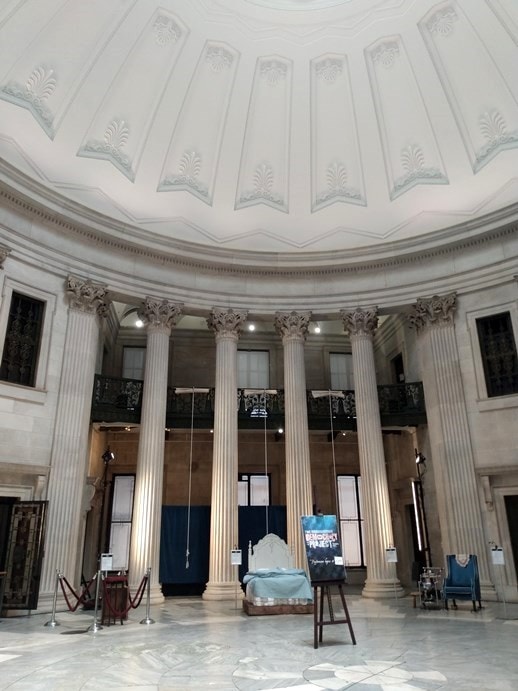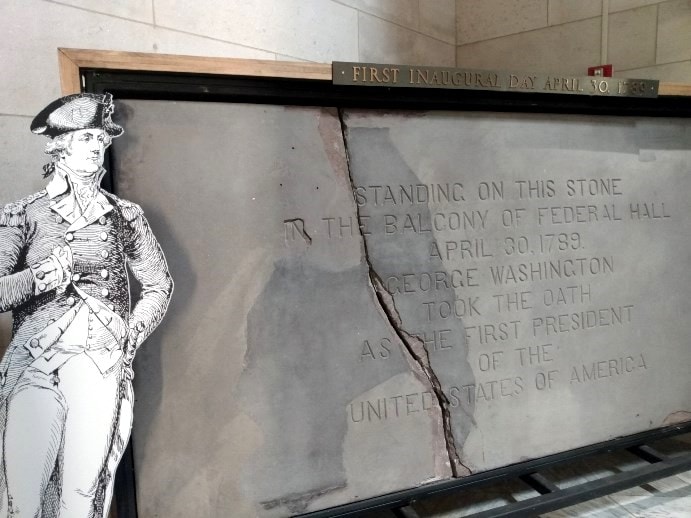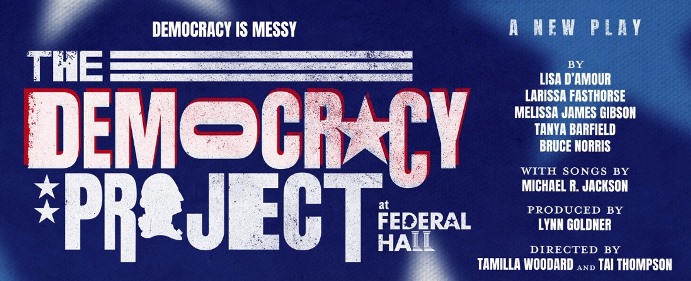For the month surrounding this year’s 4th of July celebration, visitors to NYC’s historic Federal Hall, facing Wall Street and Pine Street in the downtown Financial District, not only have the opportunity to enjoy the classic Greek Revival architecture and the educational exhibitions inside, but also a new site-specific free performance of The Democracy Project, commissioned by The Federal Hall Conservancy as part of its vision to promote American democracy through the arts, and developed over a six-year period of collaboration by a diverse team of acclaimed playwrights.

Staged in the lofty domed rotunda of the building and the balconies that surround it, the entertaining, informative, and thought-provoking show, written by WGA Award winner Tanya Barfield, Pulitzer Prize finalist Lisa D’Amour, MacArthur Genius Grant recipient Larissa FastHorse, Obie Award winner Melissa James Gibson, and Tony Award and Pulitzer Prize winners Michael R. Jackson and Bruce Norris, and directed by Tamilla Woodard and Tai Thompson, takes us on a spirited 40-minute journey – with period-style costumes and a simple scenic design by Deb O, of rolling beds, upholstered chairs, a serving cart, and scrolls that open from the upper level of the rotunda, enhanced with red, white, and blue lighting by Lucrecia Briceno – through 527 momentous days of 1789-90, when, under the new Constitution, New York was the first capital of the United States government.
Within the walls of Federal Hall, the First Congress met and inaugurated George Washington as our nation’s first President, James Madison proposed a series of amendments to the recently ratified Constitution that would become the Bill of Rights, Quaker petitions against the slave trade were presented, and the first US international treaty was made with the indigenous Muscogee (Creek) Nation and signed by their Chief Alexander McGillivray. But not all of those revolutionary principles came to fruition for all of America’s inhabitants.

The resonant story is told in the format of a meta-theatrical narrative, with the engaging and representative cast (Erin Anderson, Renata Eastlick, Jake Hart, Nathan Hinton, Tom Nelis, Joel Van Liew, and Tatiana Williams) moving around the space, frequently breaking the fourth wall, directly addressing the audience, letting us know they’re actors, not the real-life characters, and offering their own observations and comments, delivered with humor and passion. Williams’ forthright character of Alicia both serves as the present-day narrator and assumes the role of Ona Judge – a Black woman enslaved by Martha Washington, who gives her viewpoint (based on her published first-person account) on the contradictions between the ideals of liberty expressed by the Founding Fathers and the reality experienced by those not represented at Federal Hall (the current building, completed in 1842, is the second one on the site, we learn, after the original Federal-style structure – the actual 18th-century place where it happened – was demolished in 1812).
Throughout the short but impactful piece, Washington (portrayed by Nelis) struggles with a presidency he never sought, a move to New York from his home in Mount Vernon he wouldn’t have wanted, the slavery he’d like – if only in principle – to abolish (with the intent of freeing his slaves, but not Martha’s, after his death, not during his lifetime), the Bill of Rights (including the unrestricted right to weapons) drafted by Madison (played by Anderson, employing a southern accent and a puppet designed by O), the American land that was taken from the Muscogee, and a fever dream in which his wife appears to him in three different forms (the main figure played by Anderson, with Hart and Hinton also manifesting as her).
But here, the white male voices of the Father of Our Country (who saw the displaced “Indians” as the children) and the Father of the Constitution (the future fourth President) aren’t the only ones heard. We also get the perspectives of those too often excluded: the slaves Ona Judge and Billy Lee (reinforced with hilarious readily legible facial expressions by Hinton); the women (Martha recognizes that her husband “has to make it up as he goes” and notes the absence of her gender from the conversation); and the Muscogee Chief (played by Hart), who understands that the usurpation of Native American land – conjured aurally in a sound design by Mark Van Hare and Caroline Eng that recreates the birds, bears, and thunder of the natural ecosystem before the European arrival – would be tantamount to a “slow genocide” (though he was, himself, a plantation and slave owner).
And the actors, all embodying people of their own race and ethnicity (though there are some gender reversals), make their attitudes known within the context of the play, as they break character, heatedly argue, appeal to the audience, and, in the end, close with Jackson’s incisive song “Democracy Is Messy” (with music direction by Sean Cameron), since “everybody’s dream is not the same.” It’s a message that’s as relevant now, in these embattled times, as it was then.
Running Time: Approximately 40 minutes, without intermission.

The Democracy Project plays through Saturday, July 22, 2023, at Federal Hall National Memorial, 15 Pine Street, NYC. All performances are free and open to the public; to reserve tickets, go online. Masks are not required.



